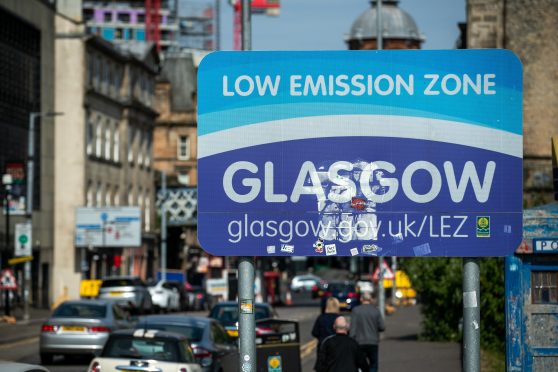
Six months after Scotland’s first Low Emission Zone came into force, businesses and industry leaders are calling for an urgent review of the scheme in Glasgow, with some fearing they face their worst festive sales period in living memory.
The controversial project, which began in June, effectively excludes the most polluting vehicles from the city centre and is aimed at protecting public health by tackling unacceptably high levels of harmful air pollution.
Similar schemes are due to go live in Edinburgh, Dundee and Aberdeen next year.
However, the most recent figures show that footfall in Glasgow last month was down by 10% on pre-Covid levels, with some businesses claiming that trade has fallen by at least double that amount, leading to concerns about their future.
One independent food outlet owner told The Sunday Post that midweek sales from passing trade had fallen back to below lockdown levels.
“Last month was the worst I have known in 13 years in business,” said Gary Rodden, who runs the Fairway Cafe just inside the boundary at Townhead. “The LEZ has all but killed our trade in the mornings.”
Glasgow footfall
David Lonsdale, director of the Scottish Retail Consortium, said that, in the run-up to Christmas, overall footfall in Glasgow has been more than a 10th below pre-pandemic levels.
He said: “Councils need to consider carefully the overall economic impact of any new policies, which might make their city centres less accessible and costlier to visit, and whether the potential revenue raised from new congestion levies measures up against the likely impact on retail and hospitality businesses trading in the city.
“One in every six stores in Scotland is lying vacant, so the focus should be on measures to bring the energy and footfall back into our larger cities rather than deterring people further from coming back.”
Leon Thompson, executive director of UK Hospitality Scotland, said restaurants, cafes and nightclubs have also been hit hard, and called for changes to the scheme. “Businesses were just starting to recover from lockdowns when the LEZ came in, so the timing of it couldn’t have been worse,” he said. “Many were left with a legacy of debt after the Covid pandemic. Now they are struggling to repay these loans because of yet another drop in footfall and visitors.
“It is unlikely that the LEZ will be scrapped but Glasgow City Council needs to urgently review the scheme, listen to the concerns of businesses and identify where improvements can be made before things get even worse.”
In June, Glasgow City Council rolled out new by-laws that prevent older vehicles that don’t comply with modern emission standards from entering the city centre. Diesel models registered before 2015 and petrol vehicles registered before 2006 cannot drive within the LEZ. Automatic number plate recognition cameras track cars entering the zone and those breaking the rules face cumulative fines ranging from £60 up to £480.
Last month it was reported that the local authority had issued 20,134 LEZ fines between June and the end of September, recovering a total of £478,560.
Glasgow’s transport convener has already ruled out relaxing LEZ rules over the festive period after a Labour councillor suggested the move could “encourage” people into the city centre.
SNP councillor Angus Millar said last week that the proposal would be contrary to the aims of the LEZ, which is a “public health measure” targeting “the most polluting vehicles”.
Calls for investment in public transport
Industry leaders say that, while it is still too early to evaluate the total cost to businesses in the city, there is also a significant issue with shift workers when there isn’t an adequate public transport provision at night, and are calling for public transport investment to address this imbalance.
They say the taxi sector in Glasgow continues to struggle to comply because of a lack of retrofit availability for vehicles and that there needs to be further consideration of the impact on goods delivery vehicles and important services such as buses and coaches servicing live music events.
However, in October a bid for a Judicial Review into the scheme launched by affected central Glasgow firm Patons Accident Repair Centre was unsuccessful.
Stuart Patrick, chief executive of Glasgow Chamber of Commerce, said that, while it is supportive of the aims of the LEZ to improve air quality within the city centre, it did not view it “as a tool to simply remove vehicles from the city and there are particular industries and businesses that are entirely reliant on vehicles to operate”.
He added: “We would like to see rapid investment in our public transport network to support our city centre economy. This is especially critical for sectors which are disproportionately impacted by the scheme, such as the night-time economy, where there are inadequate public transport options for staff and visitors.”
Paul Waterson, spokesperson for the Scottish Licensed Trade Association, said: “The city centre is dying on its feet, especially at night on weekdays. A big part of the problem is the LEZ restrictions, something that has become obvious over the past six months.
“The saviour of Scotland’s high streets will be hospitality, so this whole scheme needs to be reviewed and exemptions have to be urgently introduced before it is too late.”
Glasgow City Council said, however, that it will be “some time” before the benefits of the LEZ can be reported – particularly as the main expected benefit relates to the long-term annual average pollution concentrations.
It said: “There is a statutory process for monitoring and reporting on the effectiveness of any Scottish LEZ. The council will follow this process and report back. Our new transport strategy has a substantial focus on improving bus travel.”
A council spokeswoman said: “Poor air quality presents a serious risk to public health and so Glasgow’s LEZ is a crucial and proportionate measure to tackle the harmful pollution that has blighted the city centre for decades.
“Plans to extend Glasgow’s LEZ to all vehicle types were democratically agreed in 2018. Since then, the council has undertaken an extensive programme of communications and engagement to raise awareness of the scheme, its timescale for introduction and the availability of funding to ease compliance.
“Our research shows that buses and trains are the most common ways of getting into the city centre, with walking and the Subway also popular. We also know that the vast majority of vehicles driving into the zone already meet the emission standards, however the LEZ addresses the most polluting vehicles which disproportionately create the harmful concentrations of air pollution in the city centre.
“There is no question the night-time economy is facing a considerable combined challenge of Covid recovery and high inflation, but the city centre remains a popular destination for people seeking to enjoy themselves in Glasgow’s pubs and restaurants.
“The pandemic has led to changes in the way Glasgow city centre is used but the data we have shows that city centre footfall is higher in the evenings and at weekends than before the pandemic.
“We have been working closely with the business community on how to support the city centre and we will continue to engage with them on how to promote its continued recovery.
“Billions are now also being invested in developments that will help to boost the city centre population in the longer term and make the city centre far more resilient in future.
“To maximise the effectiveness of Glasgow’s LEZ, it is essential that compliance rates are as high as possible. This means that exemptions will only be considered in exceptional circumstances and not for general non-compliance.”
Regarding evaluation of the scheme:
A council spokeswoman said: “As pollution levels are highly variable and dependent on a number of contributing factors, it will be some time before the benefits of the LEZ can be reported – particularly as the main expected benefit relates to the long-term annual average pollution concentrations.
“There is a statutory process for monitoring and reporting on the effectiveness of any Scottish LEZ. The council will follow this process and report back, with early work on the gathering of data already underway.”
On public transport:
A council spokeswoman said: “Whilst the council does not control the running or delivery of public transport, we are working closely with partners to create the conditions that incentivises its uptake and encourages fewer car journeys.
“Our new transport strategy has a substantial focus on improving bus travel, as a switch to more sustainable forms of transport is essential in the fight against climate change, as well as reducing congestion which will make the city centre safer and more appealing for everyone.
“By delivering bus priority measures, we aim to support the kind of reliability of service that makes travelling by bus more attractive.
“The council has also committed to exploring new bus governance powers as set out in our Bus Governance Routemap which we published last year.”
Business owners
‘The timing could not have been worse’
Gillian Kirkland, who runs the Piper Whisky Bar overlooking George Square, said the LEZ has caused havoc with staff, musicians, tradespeople and suppliers who are unable to bring their vehicles into the area as they are non-compliant.
“The timing of this project could not have been worse as it came just after city businesses were starting to recover from Covid pandemic,” she said. “We all want lower levels of pollution but I just don’t think Glasgow was ready for a LEZ and the increased restrictions it brings for everyone. We put on regular live music events but some of the acts now struggle to get their equipment here.”
Kirkland explained that she had a situation recently when there was a flood in one of the pub’s toilets and it took her regular plumber hours to arrive because she discovered he had to take the train out to Linwood to pick up a replacement sink and pipes because his van wasn’t LEZ-compliant, but he couldn’t afford to turn down the job.
“Getting deliveries and supplies has been also been difficult and passing trade has dropped,” she said. “The LEZ needs to be reviewed and exemptions introduced for vital business services.”
‘We want clean air but there has to be a better way’
Leslie Docherty has co-owned city-centre clothes shop Fat Buddha for almost two decades and said that after a good run last year following the end of Covid lockdowns, in-store sales are back down by almost 20% since the LEZ was introduced.
The independent outlet, which Docherty runs with his sister, Gillian Frew, and has nine staff, has been sited in busy Queen Street since 2016. He said since
June there has been a noticeable decrease in customers dropping in to browse or buy.
“I was really optimistic when we bounced back so well last year but now we have customers saying they don’t come into town any more because their car is not LEZ compliant and it is too much hassle,” Docherty, pictured right, said.
“Fortunately, our online sales are up but it is sad that we are losing that vital personal contact with customers that is so important when trying to sustain a business like ours.
“We also usually take on extra staff for the Christmas period but not this year as they won’t be required. That is a first.”
Docherty called for a review of the LEZ, six months since its introduction.
“I have worked in retail in Glasgow for 30 years and the city centre is now dying on its feet. We all want cleaner air but there has to be a better way to do this.”
‘Passing trade down by more than 20%’
Cafe owner Gary Rodden fears he may have to close as regular customers choose to avoid the LEZ area.
The Fairway Cafe, which Rodden, 55, runs with his partner, Madeleine, is located at Townhead.
“Our passing trade is already down more than 20% and I don’t know how much longer we can survive,” Rodden said.
“The LEZ has all but killed our trade in the morning and we have had to pay off a member of staff.
“If changes aren’t made then I can’t see how we can continue operating in 2024.”
‘New rules may be seen as a difficult burden to bear for cities’
Low Emission Zone enforcement is on its way next year for three other major Scots cities. The scheme will go live in Dundee, Edinburgh and Aberdeen from early summer.
Alison Henderson, chief executive of Dundee & Angus Chamber of Commerce, said: “We are very aware that cities need to combat the climate emergency and we all have a part to play. But any additional regulation on businesses, on those that have to supply into or work within our city centre businesses or those who want to travel in to enjoy the hospitality and retail may be seen as a difficult burden to bear.”
Edinburgh Chamber of Commerce said council leaders need to understand the critical need to maintain an economically successful city centre – “one which allows businesses adequate access to goods and services, enables employees to be able to travel quickly and cost effectively to workplaces, and encourages customers”.
A spokesperson added: “More than a third of all jobs in Edinburgh are based in the centre. A Low Emission Zone that damages the economic viability of our successful city centre serves the interests of no one.”
Russell Borthwick, chief executive of the Aberdeen & Grampian Chamber of Commerce, said it is watching the situation in Glasgow to “learn the lessons from other cities who have been through the challenges”.
He added: “In Aberdeen’s case, we don’t want to see any further negative impact upon city centre businesses who have suffered extraordinary pressures during the pandemic and its aftermath.”

Enjoy the convenience of having The Sunday Post delivered as a digital ePaper straight to your smartphone, tablet or computer.
Subscribe for only £5.49 a month and enjoy all the benefits of the printed paper as a digital replica.
Subscribe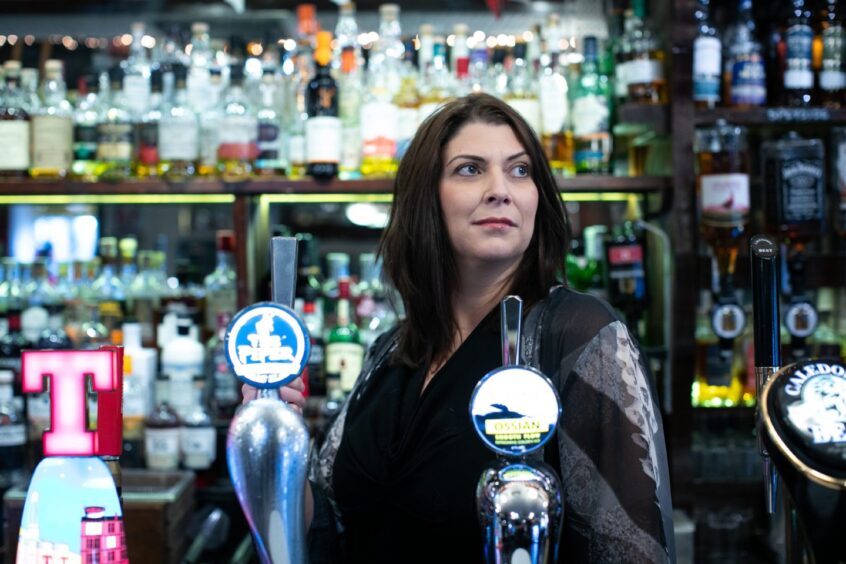 © Andrew Cawley
© Andrew Cawley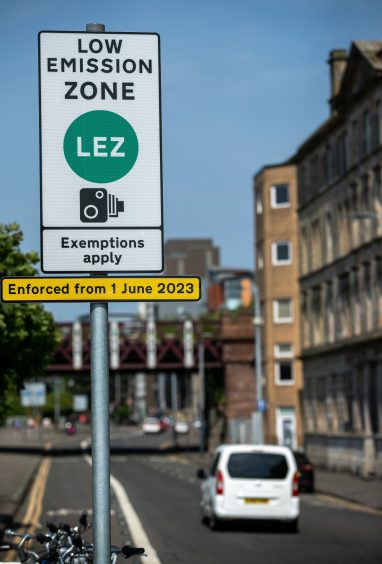 © Andrew Cawley
© Andrew Cawley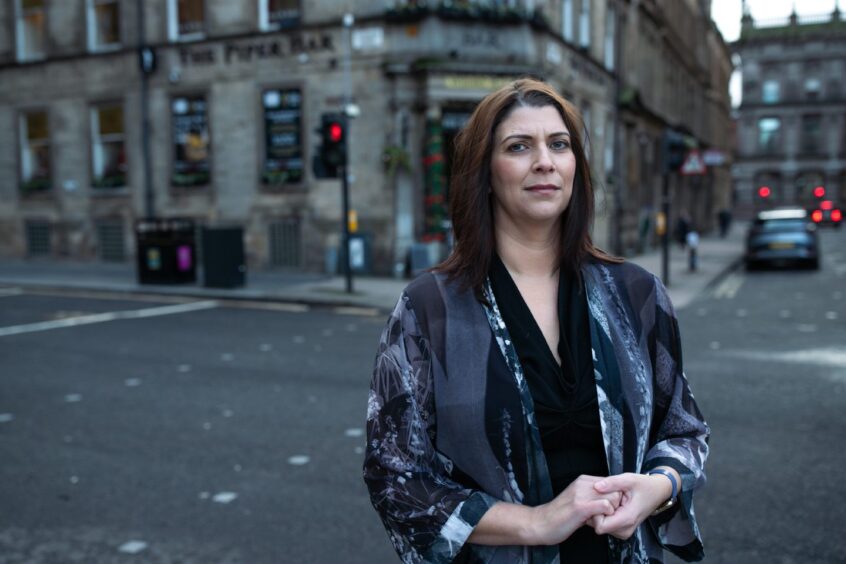 © Andrew Cawley
© Andrew Cawley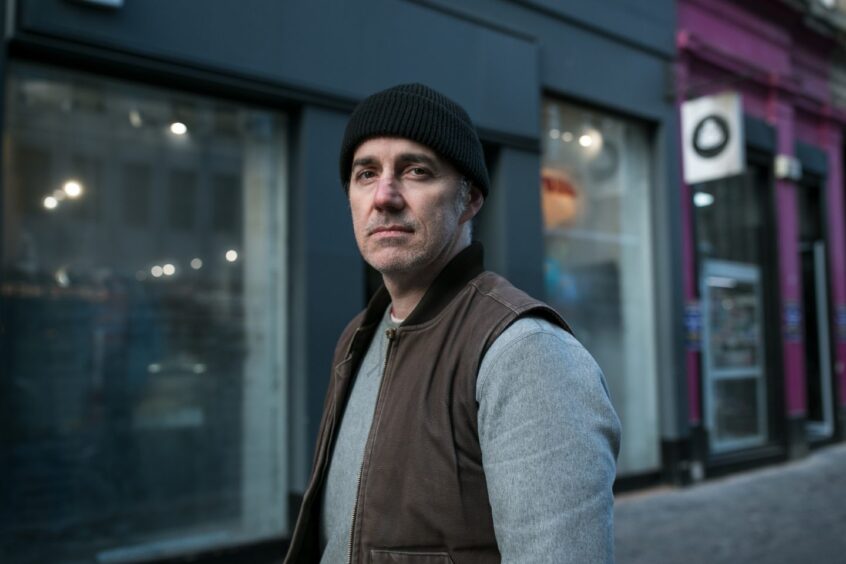 © Andrew Cawley
© Andrew Cawley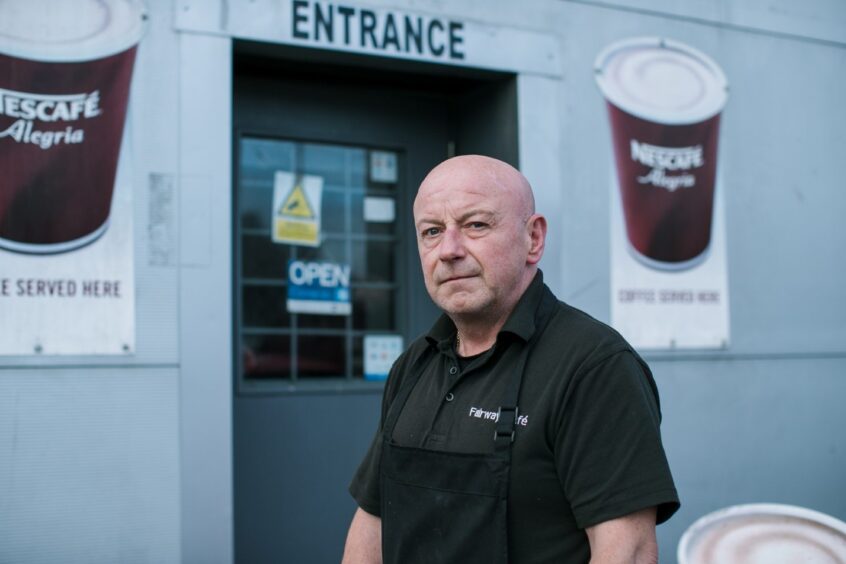 © Andrew Cawley
© Andrew Cawley